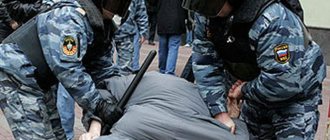ST 207 of the Criminal Code of the Russian Federation.
1. Knowingly false information about an impending explosion, arson or other actions that create a danger of death, causing significant property damage or other socially dangerous consequences, committed out of hooligan motives, -
shall be punishable by a fine in the amount of two hundred thousand to five hundred thousand rubles, or in the amount of the wages or other income of the convicted person for a period of one year to eighteen months, or by restriction of freedom for a term of up to three years, or by forced labor for a term of two to three years.
2. The act provided for in the first part of this article, committed in relation to social infrastructure facilities or causing major damage, -
shall be punishable by a fine in the amount of five hundred thousand to seven hundred thousand rubles, or in the amount of the wages or other income of the convicted person for a period of one to two years, or by imprisonment for a term of three to five years.
3. Knowingly false information about an impending explosion, arson or other actions that create a danger of death, causing significant property damage or other socially dangerous consequences in order to destabilize the activities of government bodies, -
shall be punishable by a fine in the amount of seven hundred thousand to one million rubles, or in the amount of the wages or other income of the convicted person for a period of one to three years, or by imprisonment for a term of six to eight years.
4. Acts provided for in parts one, two or three of this article, which through negligence resulted in the death of a person or other grave consequences, -
shall be punishable by a fine in the amount of one million five hundred thousand to two million rubles, or in the amount of the wages or other income of the convicted person for a period of two to three years, or by imprisonment for a term of eight to ten years.
Notes . 1. In this article, major damage is defined as damage the amount of which exceeds one million rubles.
2. In this article, social infrastructure objects are understood as organizations of healthcare systems, education, preschool education, enterprises and organizations related to recreation and leisure, service sectors, passenger transport, sports and recreational institutions, a system of institutions providing legal and financial-credit services nature, as well as other social infrastructure facilities.
Commentary to Art. 207 Criminal Code
1. The objective side is characterized by action in the form of a knowingly false report about an impending terrorist act (Article 205 of the Criminal Code). Such a message can be expressed in any form (orally, in writing, using means of communication; both anonymously and with an indication of the author) and sent to any addressee (authorities, heads of enterprises, institutions, organizations, as well as individual citizens).
2. The crime is considered completed from the moment the message is received by the addressee.
3. The subjective side is characterized by the fact that a person must knowingly know about the falsity of his message, and the absence of the goals specified in Art. 205 of the Criminal Code (which makes it possible to distinguish this crime from a terrorist act).
4. Qualified personnel assume liability for causing major damage (exceeding, according to the note to the article, 1 million rubles) or the occurrence of other serious consequences (for example, serious harm to health or death of a person).
Consultation with a criminal lawyer. 8
send an application
Disposition of Article 207.1 of the Criminal Code of the Russian Federation
Art. 207.1 of the Criminal Code of the Russian Federation. “Public dissemination, under the guise of reliable messages, of knowingly false information about circumstances that pose a threat to the life and safety of citizens, and (or) about measures taken to ensure the safety of the population and territories, methods and methods of protection from these circumstances”
The sanction for committing these actions is a fine in the amount of three hundred thousand to seven hundred thousand rubles or in the amount of wages for a period of one to one and a half years. Punishment may also be imposed in the form of compulsory labor for a term of up to three hundred and sixty hours or correctional labor for a term of up to one year. In addition, punishment may be imposed in the form of restriction of freedom for up to three years.
According to the notes to Art. 207.1 of the Criminal Code of the Russian Federation, circumstances that pose a threat to the life and safety of citizens are recognized as natural and man-made emergencies, environmental emergencies, including epidemics, epizootics and other circumstances resulting from accidents, hazardous natural phenomena, catastrophes, natural and other disasters , resulting (may result) in human casualties, damage to human health and the environment, significant material losses and disruption of the living conditions of the population.”
In our age of modern technology, the main place from which we get information is the Internet and various social networks. There, we share information with other users. Share, i.e. distributing information is very easy, just click the “share” button and other people can see the information you are interested in. Thus, you commit public distribution.
Conditions under which criminal liability arises.
Firstly, information must relate to circumstances that pose a threat to the life and safety of citizens or about measures taken to ensure the safety of the population and territories, methods and methods of protection from these circumstances.
Secondly, in order for a person’s actions to disseminate information to become criminal, the following conditions (qualifying characteristics) are necessary, namely:
— “public dissemination”: information must be disseminated publicly, i.e. information must be accessible to a group of people;
- “knowingly false information”: the information must be false and the person who disseminates it must know that he is disseminating false information;
- “type of reliable information”: information must be disseminated as credible.
Disposition of Article 207.2 of the Criminal Code
Article 207.2 of the Criminal Code of the Russian Federation. “Public dissemination of deliberately false socially significant information, resulting in grave consequences.”
Part 1: “Public dissemination, under the guise of reliable messages, of knowingly false socially significant information, resulting in negligence in causing harm to human health”
Part 2: “The same act, which through negligence resulted in the death of a person or other grave consequences”
Sanction for committing the specified acts. Part 1 - a fine in the amount of seven hundred thousand to one million five hundred thousand rubles or in the amount of wages for a period of up to one and a half years. Also, punishment in the form of correctional labor for a term of up to one year, or forced labor for a term of up to three years, or imprisonment for a term of up to three years.
If, as a result of the above actions, a person died or other grave consequences occurred, then the punishment may be in the form of a fine in the amount of one million five hundred thousand to two million rubles or in the amount of wages for a period of one and a half to three years. Either correctional labor for a term of up to two years, or forced labor for a term of up to five years, or imprisonment for a term of up to five years.
Conditions under which criminal liability arises.
In Art. 207.2 of the Criminal Code of the Russian Federation, the qualifying criteria are: public dissemination of information that must be knowingly false, as well as it must be given a reliable appearance.
The first distinguishing feature between these articles is the information that is disseminated. The information should only be of public importance. According to the definition, socially significant information is information that satisfies the needs of citizens for knowledge and understanding of social processes.
A necessary condition is also the occurrence of certain consequences. In part one of Art. 207-2 of the Criminal Code of the Russian Federation, consequences such as causing harm to human health through negligence must occur. In the second part of this article, causing by negligence the death of a person or other grave consequences.
Second commentary to Art. 207 of the Criminal Code of the Russian Federation
1. The objective side is characterized by an action in the form of a deliberately false report about an impending explosion, arson or other actions that create a danger of death, causing significant property damage, or the occurrence of other socially dangerous consequences.
For a description of the consequences, see the commentary to Art. 205 of the Criminal Code.
The message specified in the law can be expressed in any form, both anonymously and with an indication of the author, and sent to any addressee (authorities, heads of enterprises, institutions, organizations, as well as individual citizens). It is important that it be false, i.e. did not correspond to the real facts, and concerned information about an impending explosion, arson or other actions that create a danger of death of a person, causing significant property damage or the occurrence of other socially dangerous consequences.
If a deliberately false report about a terrorist act contains information about persons allegedly preparing to commit it, then in this case there is an ideal set of crimes provided for in Art. 207 and art. 306 of the Criminal Code.
In case of a person’s honest mistake or incorrect assessment of the transmitted information committed under Art. 207 is excluded.
2. The crime is considered completed from the moment the message is received by the addressee.
3. The subjective side is characterized by direct intent and hooligan motive. In this case, the person obviously knows about the falsity of his message and he must not have the purpose provided for in Art. 205 of the Criminal Code.
If the act set out in Part 1 of Art. 207, is committed with the aim of destabilizing authorities, then criminal liability arises under Part 3 of Art. 207.
4. The subject of the crime is a person who has reached the age of 14 years.
5. Criminal liability is enhanced (Part 2 of Article 207) if, as a result of a knowingly false report about an act of terrorism, large damage was caused (over 1 million rubles) or the act was committed in relation to social infrastructure facilities (see Note 2 to Art. 207).
6. Particularly qualifying consequences (Part 4) - causing the death of a person through negligence or the occurrence of other grave consequences.
For this crime, property damage is more typical, but other grave consequences should include consequences whose nature and degree of public danger are commensurate with the death of a person (for example, causing serious harm to human health).
Judicial practice under Article 207 of the Criminal Code of the Russian Federation
Appeal ruling of the Judicial Collegium for Criminal Cases of the Supreme Court of the Russian Federation dated 02/21/2019 N 36-APU19-1
by the verdict of the Oktyabrsky District Court of Vitebsk dated September 8, 2010 (taking into account changes made by the Judicial Collegium for Criminal Cases of the Vitebsk Regional Court of the Republic of Belarus) Tumashevich B.N. found guilty of the fact that on December 5, 2008, in order to take possession of property, I. used violence against her that was dangerous to life and health, causing grievous bodily harm, as a result of which he took possession of property belonging to the victim in the amount of 23,606,485 Belarusian rubles, which is a large amount . The crime was committed in Vitebsk, Republic of Belarus. For this crime, provided for in Part 3 of Art. 207 of the Criminal Code of the Republic of Belarus, Tumashevich B.N. sentenced to 9 years in prison.
Appeal ruling of the Judicial Collegium for Criminal Cases of the Supreme Court of the Russian Federation dated 06/08/2017 N 32-APU17-12
- according to Part 1 of Art. 207 of the Criminal Code of the Russian Federation to imprisonment for a period of 1 year - under paragraph “c” of Part 4 of Art. 162 of the Criminal Code of the Russian Federation to imprisonment for a term of 11 years with restriction of freedom for 1 year,
Cassation ruling of the Judicial Collegium for Criminal Cases of the Supreme Court of the Russian Federation dated 07/02/2020 N 32-UD20-14-A4
April 29, 1999, as amended, under Art. 103, part 2 art. and pp. “e”, “z”, “i”, “n” art. 102, art. 207 Criminal Code of the RSFSR, Part 2, Art. 162 of the Criminal Code of the Russian Federation using Part 1 of Art. Criminal Code of the RSFSR to 14 years 3 months in prison, released on November 9, 2012 after serving the sentence;
Law on fines for fakes
The draft amendments to the Criminal Code of the Russian Federation No. 929651-7 was submitted to the State Duma of the Russian Federation on March 25, 2022, it was developed directly by the head of the State Duma, Vyacheslav Volodin, and the chairman of the Russian State Duma Committee on Legislation, Pavel Krasheninnikov. Initially it contained only amendments to Art. 236 of the Criminal Code of the Russian Federation, providing for tougher penalties for non-compliance with sanitary rules and regulations. However, by the second reading the draft was supplemented with new articles: 207.1 and 207.2. Thus, criminal liability is actually introduced for any “fakes” about the coronavirus, which is why the amendments were made.
Already on March 31, 2022, the bill was approved by the Federation Council, and it will probably be signed by the President of the Russian Federation in the coming days. The Criminal Code of the Russian Federation with amendments and additions is not yet publicly available, since the law has not yet been adopted; the bill can be found on the State Duma website using the details. Comments from legislators can also be found on this resource; the main ones are set out in the Explanatory Note to the project.
The law will come into force immediately after its official publication - on the same day when it is signed by the head of state. Official publication is currently carried out on electronic resources, on the legal information website.
Law on fines for violating quarantine and self-isolation in Moscow in 2020 - what is important to know?
Application practice
It is obvious that Article 207.1 of the Criminal Code of the Russian Federation will be actively used in 2022, since it is already known that fines will be imposed on ordinary citizens. While punishments follow in the form of fines under Art. 13.15 Code of Administrative Offenses of the Russian Federation. Roskomnadzor also warned all media and information resources about responsibility for false news.
Article 207.2 of the Criminal Code of the Russian Federation in 2022 raises more questions in practice. To bring to justice it will be necessary to prove the existence of consequences and a direct cause-and-effect relationship between the crime and their occurrence.
Art. 236 of the Criminal Code of the Russian Federation “Violation of sanitary and epidemiological rules” in 2020 - review of the new edition




